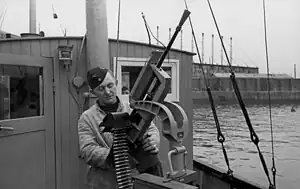Darne machine gun
The Darne machine gun is a machine gun of French origin.[1]
| Mitrailleuse Darne | |
|---|---|
 Captured Darne machine gun mounted as an anti-aircraft weapon | |
| Type | Machine gun |
| Place of origin | France |
| Service history | |
| Used by | See Users |
| Production history | |
| Manufacturer | Darne |
| Variants | See Variants |
| Specifications | |
| Mass | 7.8 kg |
| Length | 1.12 m |
| Cartridge | 8 mm Lebel .303 British 7.5x54mm MAS −(mod. 1929)− 7x57mm Mauser |
| Caliber | 8 mm 7.7 mm 7.5 mm 7mm |
| Action | Gas, tilting breech block |
| Rate of fire | 1100-1200 rounds per minute |
| Muzzle velocity | 830 m/s |
| Maximum firing range | 500 m (effective range around 200 m) |
| Feed system | Belt |
| Sights | Iron |
Development
The French gun-making company Darne, which became famous for its innovative shotguns, began making military weapons in 1915, when it was contracted by French government to manufacture Lewis machine guns. In 1916 this same company announced the development of its own indigenous design of machine gun. This belt-fed weapon was designed especially for rapid manufacturing techniques, and without any unnecessary refinements typical for most contemporary small arms. External finish and appearance of the Darne machine gun was crude, but worked well and its price was much lower than of any contemporary weapon with comparable combat characteristics.
The French Army tested Darne machine guns during 1917/1918, but the Great War ended before production contracts could have been signed. Despite this, during the 1920s and 1930s the Darne company managed to refine an aircraft variant of the machine gun to the point where it was adopted by French and some other air forces for the role of an observers gun.[2] However, there were many more variants of the Darne machine gun, although most were certainly less successful. For example, in the 1920s and 1930s Darne offered a number of lightweight belt-fed machine guns for infantry or vehicle use. All these machine guns were made according to the same principle of reducing cost, but unlike its aircraft variants found no buyers during the inter-war period.
It was eventually replaced by the MAC 1934 for Air Force use, although the French Navy continued to use them into World War II. Small numbers were also exported to Brazil, Spain, Yugoslavia, Italy and Lithuania, and captured French Darnes were used by German occupation forces for coastal defense. The initial guns were made by Darne in France but it appears that later production was outsourced to Spain, where it could be done more cheaply.
Overview

The Darne machine gun is gas operated, firing from open bolt in full automatic only. The breech is locked by tilting the rear part of the bolt up into the mortise cut in the roof of receiver (similar to the M1918 Browning Automatic Rifle). The Darne machine gun has an unusual belt feed between the gas piston and barrel, using the two-stage cartridge feed system (cartridge withdrawn from the belt to the rear, and then pushed forward into the barrel). The weapon usually has provisions to attach a belt box directly below the receiver to improve handling characteristics of the gun. Earlier versions of the Darne were chambered for the 8mm Lebel and .303 British cartridge, but the weapon was quickly updated to the new 7.5mm French military cartridge. Some export guns were also made in 8mm Mauser, and various other cartridges.
Variants
Land Variant
Infantry versions of the Darne machine gun were normally fitted with a pistol grip and rifle-type trigger below receiver, and a wooden buttstock. Alternate variants featured skeletonized pistol grip made of metal and a top-folding shoulder stock, also made of metal. A folding bipod or a compact lightweight tripod was used to mount the Darne machine guns in ground roles.
Aircraft Variant
The aircraft variant equipped French aircraft until 1935 when it was replaced by the MAC 1934, except in naval aircraft. Often criticized for its lack of reliability in the aircraft role, as other similar rifle calibers, the 7.5 mm bullets proved to be too light for air combat in World War II.[3][4][5]
See also
References
- "Darne light machine gun (France)". World Guns. Retrieved 15 August 2015.
- "Darne Mle 1923 Manual". Forgotten Weapons. Retrieved 15 August 2015.
- "History". Armurerie Darne. 2015. Retrieved 15 August 2015.
- ggournet (2015). "Darne machine gun". Photobucket. Retrieved 15 August 2015.
- ggournet (2015). "Twin Darne for aircraft". Photobucket. Retrieved 15 August 2015.